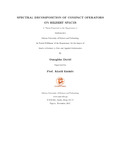Browsing by Title
Now showing items 3918-3937 of 4790
-
Spatial and Temporal Abstractions in POMDPs Applied to Robot Navigation
(2005-09-27)Partially observable Markov decision processes (POMDPs) are a well studied paradigm for programming autonomous robots, where the robot sequentially chooses actions to achieve long term goals efficiently. Unfortunately, ...
-
Spatial Disposition of Axes in a Generalized Cylinder Representation of Objects
(1975-12-01)It is proposed that the 3-D representation of an object is based primarily on a stick-figure configuration, where each stick represents one or more axes in the object's generalized cylinder representation. The loosely ...
-
Spatial Knowledge
(1976-06-01)This paper introduces a model of spatial cognition to describe the states of partial knowledge that people have about the spatial structure of a large-scale environment. Spatial knowledge has several different ...
-
The spatial learning method : facilitation of learning through the use of cognitive mapping in virtual reality
(University of Cape TownFaculty of ScienceDepartment of Computer Science, 2002)When moving through an environment, people unconsciously build up a mental image, or cognitive map, of that environment. When later planning a trip or giving directions to someone else, they can mentally walk through the ...
-
Spatial Planning: A Configuration Space Approach
(1980-12-01)This paper presents algorithms for computing constraints on the position of an object due to the presence of obstacles. This problem arises in applications which require choosing how to arrange or move objects among ...
-
Spatial Reference Frames for Object Recognition: Tuning for Rotations in Depth
(1995-03-01)The inferior temporal cortex (IT) of monkeys is thought to play an essential role in visual object recognition. Inferotemporal neurons are known to respond to complex visual stimuli, including patterns like faces, ...
-
Spatio-Temporal Reasoning and Linear Inequalities
(1986-05-01)Time and space are sufficiently similar to warrant in certain cases a common representation in AI problem-solving systems. What is represented is often the constraints that hold between objects, and a concern is the ...
-
Spatiotemporal Self-Organization of Fluctuating Bacterial Colonies.
(APSPhysical review letters, 2017-11-03)We model an enclosed system of bacteria, whose motility-induced phase separation is coupled to slow population dynamics. Without noise, the system shows both static phase separation and a limit cycle, in which a rising ...
-
Specialization of Perceptual Processes
(1995-04-22)In this report, I discuss the use of vision to support concrete, everyday activity. I will argue that a variety of interesting tasks can be solved using simple and inexpensive vision systems. I will provide a number ...
-
Specification and implementation of the Larch shared language
(University of Cape TownFaculty of ScienceDepartment of Computer Science, 1989)This project aims to prototype formal specification in Larch. The motivation for looking at formal specifications stems from an appreciation of the problem outlined above, frustration with current methods, and a desire to ...
-
Specification and Proof Techniques for Serializers
(1977-08-01)This paper presents an implementation mechanism, specification language, and proof techniques for problems involving the arbitration of concurrent requests to shared resources. This mechanism is the serializer which ...
-
Specification and verification of context conditions for programming languages
(University of Cape TownFaculty of ScienceDepartment of Computer Science, 1986)Context conditions - also called static semantics - are the constraints on computer programs that cannot be reasonably expressed by a context-free grammar, but that can be statically checked without considering the execution ...
-
Specification and verification of systems using model checking and Markov reward models
(University of Cape TownFaculty of ScienceDepartment of Computer Science, 2004)This thesis examines Markov reward models, a formalism based on continuous time Markov chains, and it's usage in the generation and analysis of service levels. The particular solution technique we employ in this thesis is ...
-
Specifying and Proving Properties of Guardians for Distributed Systems
(1979-06-01)In a distributed system where many processors are connected by a networ and communicate using message passing, many users can be allowed to access the same facilities. A public utility is usually an expensive or limited ...
-
Specifying and Proving Properties of Guardians for Distributed Systems
(MIT Artificial Intelligence Laboratory, 1979-05)In a distributed system where many processors are connected by a network and communicate using message passing, many users can be allowed to access the same facilities. A public utility is usually an expensive or limited ...
-
Spectral Alignment of Networks
(2015-02-18)Network alignment refers to the problem of finding a bijective mapping across vertices of two or more graphs to maximize the number of overlapping edges and/or to minimize the number of mismatched interactions across ...
-
Spectral analysis of neutral evolution
(University of Cape TownFaculty of ScienceDepartment of Computer Science, 2017)It has been argued that much of evolution takes place in the absence of fitness gradients. Such periods of evolution can be analysed by examining the mutational network formed by sequences of equal fitness, that is, the ...
-
Spectral Decomposition of Compact Operators on Hilbert Spaces
(2017-11-23)Compact operators are linear operators on Banach spaces that maps bounded set to relatively compact sets. In the case of Hilbert space H it is an extension of the concept of matrix acting on a finite dimensional vector ...
-
Spectral gap in the group of affine transformations over prime fields
(University of ToulouseAnnales de la Faculte des Sciences de Toulousehttp://afst.cedram.org/item?id=AFST_2016_6_25_5_969_0, 2016-11-01)We study random walks on the groups $\Bbb F^d_p \rtimes$ SL$_d$($\Bbb F_p$). We estimate the spectral gap in terms of the spectral gap of the projection to the linear part SL$_d$($\Bbb F_p$). This problem is motivated by ...
-
Spectral methods and computational trade-offs in high-dimensional statistical inference
(Department of Pure Mathematics and Mathematical Statistics, University of CambridgeUniversity of CambridgeDepartment of Pure Mathematics and Mathematical StatisticsFaculty of MathematicsSt John's College, 2016-10-04)Spectral methods have become increasingly popular in designing fast algorithms for modern highdimensional datasets. This thesis looks at several problems in which spectral methods play a central role. In some cases, we ...

